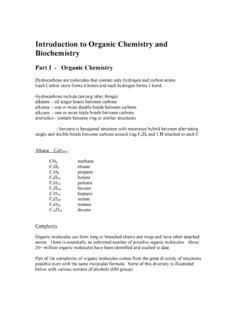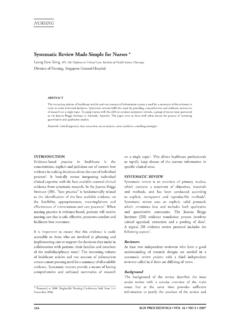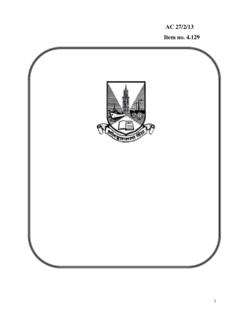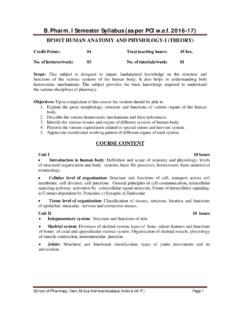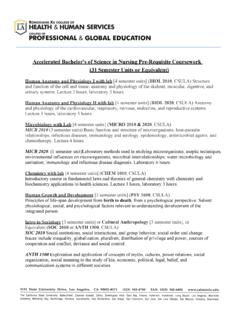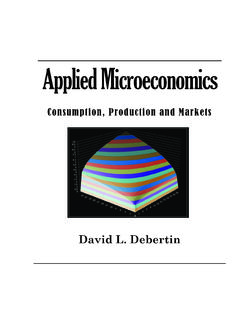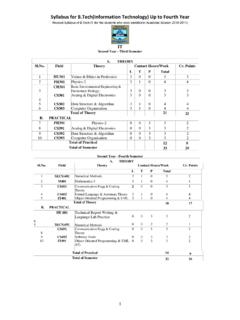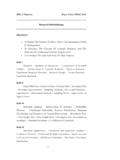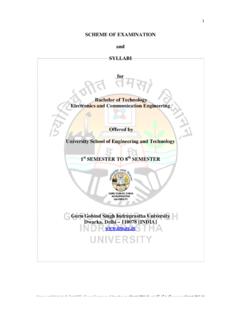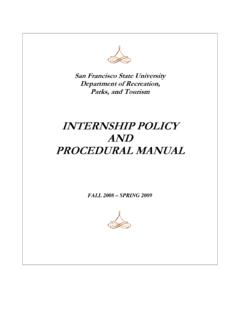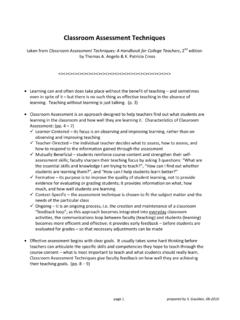Transcription of Theory Based Nursing Practice (TBNP) A working document …
1 1 Theory Based Nursing Practice (TBNP). A working document by The University of Tennessee at Chattanooga School of Nursing Faculty & Students Updated Fall 2014 (citation corrections Sept 2016) 2 PREFACE. We hope this packet will be a helpful reference for students, faculty, as well as for Clinical Teachers. Scholarship and professional Practice is only possible with reflection, critique and growth, thus, this is a working document ; suggestions for content and clarity are actively solicited. An obligation of professionalism is lifelong learning and reflection. Orem recognizes that development in a professional role grows throughout the nurse's lifetime; this Handbook will develop as we grow as Orem scholars and practitioners.
2 Some of the terminology will be new to you; some will be familiar, but used in a different way. Italicized words are those with a specific theoretical definition as defined by Dorothea Orem. The Practice of Nursing is complex requiring time and experience to have the knowledge needed to Practice Nursing to this end, the courses in this curriculum have been developed to build on each other to provide you the knowledge to enter professional Practice . Upon graduation, the responsibility for maintaining and developing your capabilities, lies with you. We expect you to leave this program as developing leaders, valuing lifelong learning, and with a desire to nurture and support other colleagues, especially the newest members of the profession.
3 We hope you develop and grow your passion in Nursing . About Dorothea Orem Dorothea Orem was born in Baltimore, Maryland in 1914. She received her diploma in Nursing in 1934 from Providence Hospital School of Nursing , Washington, Orem received her bachelor of science in Nursing education in 1939 and a master of science in Nursing education in 1945 from Catholic University of America, Washington She had a varied background in clinical Practice : OR, pediatrics, adult med-surg, private duty, and ER supervisor. She taught biological sciences, served as director of Nursing service and director of the school of Nursing at Providence Hospital, Detroit, Michigan.
4 In 1949, she went to the Indiana State Board of Health, Hospital Division, where she worked to help upgrade the Nursing services in general hospitals in Indiana. As part of her master's degree work, Orem had to formulate a definition of Nursing . During 1958-59, she worked as a consultant to the Office of Education, Department of Health, Education and Welfare in Washington and participated in a project to improve practical nurse training. This work stimulated her to seek to identify the condition or circumstances under which a decision is made that Nursing care is needed.
5 Her answer encompassed the idea that a nurse is another self . This idea evolved into her Nursing concept of self-care and later into the Self Care Deficit Nursing Theory . Self-care implies that when they are able, individuals care for themselves. When the person is unable to care for themselves, the nurse provides the assistance needed. For children, Nursing care is needed when parents or guardians are unable to provide the amount and quality of care needed. This concept was first published in 1959. She worked with other nurse faculty members from the Catholic University of America to continue the work and develop this concept further.
6 In 1971, Orem published Nursing : Concepts of Practice . It is now in its 6th edition. Throughout her career, she was the recipient of numerous honorary degrees; several doctor of science degrees, national awards, and Sigma Theta Tau International awards. Dorothea Orem died in June of 2007. Updated Fall 2014 (citation corrections Sept 2016) 3 CHAPTER ONE. Introduction to Theory - Based Nursing The healthcare environment is relentlessly growing more complex as have the responsibilities for professional Nursing . Often it is not clear what is Nursing and what is not, to quote Florence Nightingale (1859).
7 The UTC School of Nursing is preparing students for this complex environment with a foundation for all of the possibilities that lie ahead to this end, we committed to a curriculum Based on a Nursing Model, The Orem Self-care Deficit Nursing Theory . This is just one Nursing model of several, but was one that was philosophically congruent with the faculty. What Is Nursing Theory ? Nursing Theory is the term given to the body of knowledge that is used to support Nursing Practice . Theory is the creative and systematic way of looking at the world or an aspect of it to describe, explain, predict, or control it.
8 The first term to consider in learning about Theory is the concept. Concepts may be empirical or abstract depending on their ability to be observed in the real world. Concepts are said to be empirical when they can be observed or experienced through the senses. Example: A stethoscope is an example of an empirical concept because it can be seen and touched. Abstract concepts are those that are not observable, such as caring, hope and infinity. A Nursing Theory provides the framework that links Nursing research, Nursing Practice , and Nursing knowledge. Why Use Orem's Self Care Deficit Theory of Nursing ?
9 It provides a positive frame of reference about nurses, patients, and the interactions between the two. It promotes clear understanding of the nature and scope of Nursing , clarifying what Nursing is, what it is not, and what it could be. It provides communication, structure, focus, links relevant knowledge, provides clarity and specifies outcomes or goals for Nursing that facilitate ways in which to demonstrate the effectiveness of Nursing care and accountability for Nursing actions. Orem- Based Nursing Practice The debate whether Nursing is a profession is over and even though the development of her Theory began at a time when this was a philosophic question, Orem (2001) leaves no doubt that Nursing is a profession, and describes the knowledge needed for Practice in the context of health care.
10 The following is Based on her last book (2001). All of the health professions share knowledge in the broad liberal arts. There are also some specialized pre-requisites for most of the professions , Anatomy and Physiology. Each profession, however, makes a unique contribution to the person receiving health care. Furthermore, Orem (2001) says the role each profession plays is determined by the health care needs of the person (patient), such as a disease, for example. The phenomenon disease is the focus of medical Practice (medical diagnosis, treatment, prevention, etc). The health care needs of a patient requiring Nursing care relate to the self-care requisites.


